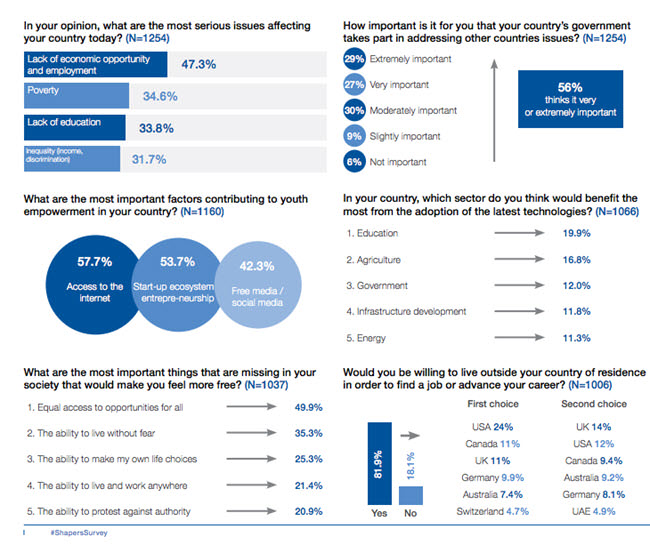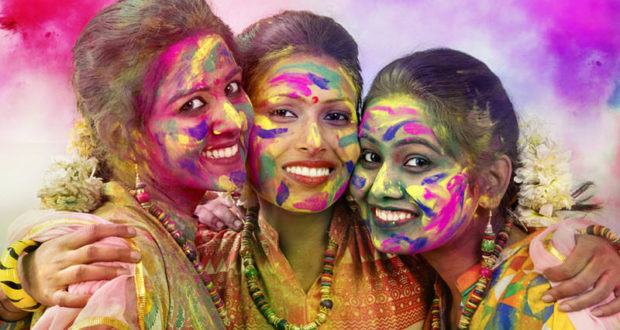Last month, the World Economic Forum launched the third edition of the world’s most geographically diverse survey of millennials, the Global Shapers Annual Survey 2017. Over 31,000 people aged between 18 and 35 responded, giving insights into their views on society, business, politics, the economy and technology as well as their workplace and career aspirations. Climate change remained the biggest global concern for the third year in a row.
The survey also identified the regional issues that most concern South Asia’s young people. Those include the lack of economic opportunity and employment (selected by 47.3% of those surveyed), poverty (34.6%), lack of education (33.8%) and inequality (31.7%).
South Asia is currently at a crossroads. Over the years to come, its prospects for equitable growth will largely depend on the region’s ability to address fundamental issues such as creating jobs, increasing transparency, boosting living standards and shared prosperity. With an increasingly youthful population, there is an unprecedented opportunity for young people to take an active role in shaping the region’s future.

The South Asian results from the 2017 by Global Shapers Survey.
Job creation
Home to 1.7 billion people, South Asia is the world’s fastest-growing but least-integrated region. In today’s world of rapid technological change and increasing competitiveness, South Asian countries need a well-educated, dynamic and skilled workforce to sustain long periods of growth. According to the World Bank, job creation is a key priority on the agenda, given that the region will have to absorb close to 1 million new workers every month for the next three decades.
Through the SAFER initiative, Shapers from the Kolkata’s hub in India have trained over 500 people with basic first-aid courses to stabilize patients and cut response time when an ambulance is called but is slow to reach certain locations in urban slums.
Equitable growth
It is undeniable that strong growth and resilience have contributed significantly towards reducing poverty in South Asian countries. Despite this impressive progress, however, the region remains home to the world’s largest number of poor. Job creation, as well as investment in education, health and urban development will help to boost equitable growth and prosperity.
With this in mind, Global Shapers’ Dhaka Hub in Bangladesh – hubs are groups of young Global Shapers working to bring positive change to their communities – brought together 150 children from six urban slums and used a football tournament as a tool for local development, addressing issues such as education, health awareness and social inclusion. The tournament motivated and delivered important messages to disadvantaged young people between the ages of 10 to 14.
Education
While the region has made tremendous gains in expanding access to schooling over the past decade, poor-quality education is still a major impediment to its development and growth, according to the World Bank. Education must be improved at all levels to equip students, teachers and workers with skills relevant for today’s requirements.
Conscious of this growing need, the Ahmedabad Hub in India is pushing for education equality by building educational resources for young Indians on subjects not included in schools’ standard curricula. Their project, ‘Shaping Education’, addresses non-conventional issues such as gender sensitivity, menstrual taboo, the lack of access to knowledge for the underprivileged, and the lack of awareness of basic citizens’ rights. Shaping Education is also creating sustainable community libraries, online do-it-yourself tutorials for educators, and workshops to educate the community about rights and gender issues.
Opportunities for all
“Women and men must be equal partners in managing the challenges our world faces – and in reaping the opportunities. Both voices are critical in ensuring the Fourth Industrial Revolution delivers its promise for society,” as Klaus Schwab, founder and executive chairman of the World Economic Forum, has said. Despite its rapid growth, South Asia has some of the worst human development outcomes, with millions of people lacking access to clean water, sound healthcare, electricity and education – and as per the latest World Economic Forum Global Gender Gap Report, it will take South Asia an entire millennium to reach gender equality in the workplace.
Progress on closing the gender pay gap has also been negligible. Members of the Lahore Hub in Pakistan have developed the ‘Gender Stories’ initiative, which aims to bring inequality to light, fuel public discourse and find new solutions to address inequality locally through workshops, films and media. So far, 5,000 people have engaged in the workshops and campaigns organised by the Hub.
Two people who are amplifying the voices of youth: Malvika Iyer and Utkarsh Amitabh
Half the world’s population is under the age of 30. Yet their voices are often excluded from decisions that will affect them. Representing a new generation of hope, millennials have a strong desire to be a part of the change. As a collective body they must take action to transform existing challenges into opportunities, push boundaries and rethink current systems by exploring new models of growth based on human dimensions, cultural identities and a sense of purpose.
Malvika Iyer, a Global Shaper, is driven by her passion to inspire others. She is a bilateral amputee and bomb-blast survivor who is working on issues related to gender empowerment and giving a voice to the differently-abled. Malvika is a member of the Working Group on Youth and Gender Equality at the UN Inter-Agency Network on Youth Development, and she has been invited to co-chair the upcoming India Economic Summit alongside a panel of highly diverse business leaders, policymakers and experts.
She hopes to use this opportunity to raise young people’s concerns and to bring greater awareness of the most pressing issues around education and inclusion. Living with a disability has never stopped Malvika from bringing positive change and helping to build a more compassionate world. Her determination to overcome adversity is a fantastic example of perseverance, courage and positivity. Fighting her own battles, she became a strong advocate for inclusion of disability rights by transforming life challenges into meaningful opportunities, which will undoubtedly inspire many.
Similarly, Utkarsh Amitabh, a Global Shaper of the Delhi hub and Founder of Network Capital, a global peer mentoring community active in 89 countries, will be a voice of youth at the first Open Forum to be help in India. This special session was developed to give a local audience; students, entrepreneurs, young professionals and the general public an opportunity to discuss their vision of India by 2022.
Transforming education and employability, enabling innovation and entrepreneurship and empowering youth through sports, arts and culture will be topics tackled by the panellists. Amitabh has said: “To creatively leverage India’s demographic dividend, we need youth who think, dream and build sustainable solutions for systemic challenges. Towards that end, I welcome NITI Aayog’s Atal Innovation Mission which is a nationwide movement to create next-generation entrepreneurs. It attempts to shift focus from rote learning to creative thinking. Network Capital has partnered with Atal Innovation to provide trained mentors to Atal Tinkering Labs across the country and I am enthused by the possibilities this can unleash.”
–
Source: The World Economic Forum
 World Certification Institute – WCI | Global Certification Body World Certification Institute (WCI) is a global certifying body that grants credential awards to individuals as well as accredits courses of organizations.
World Certification Institute – WCI | Global Certification Body World Certification Institute (WCI) is a global certifying body that grants credential awards to individuals as well as accredits courses of organizations.


